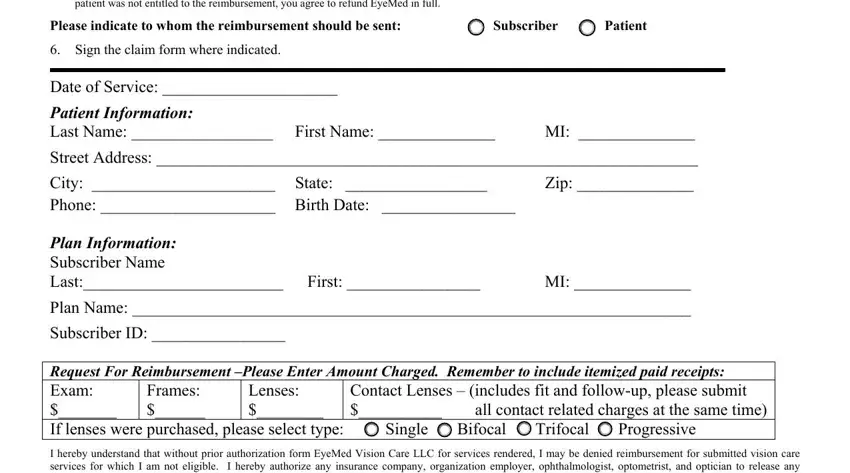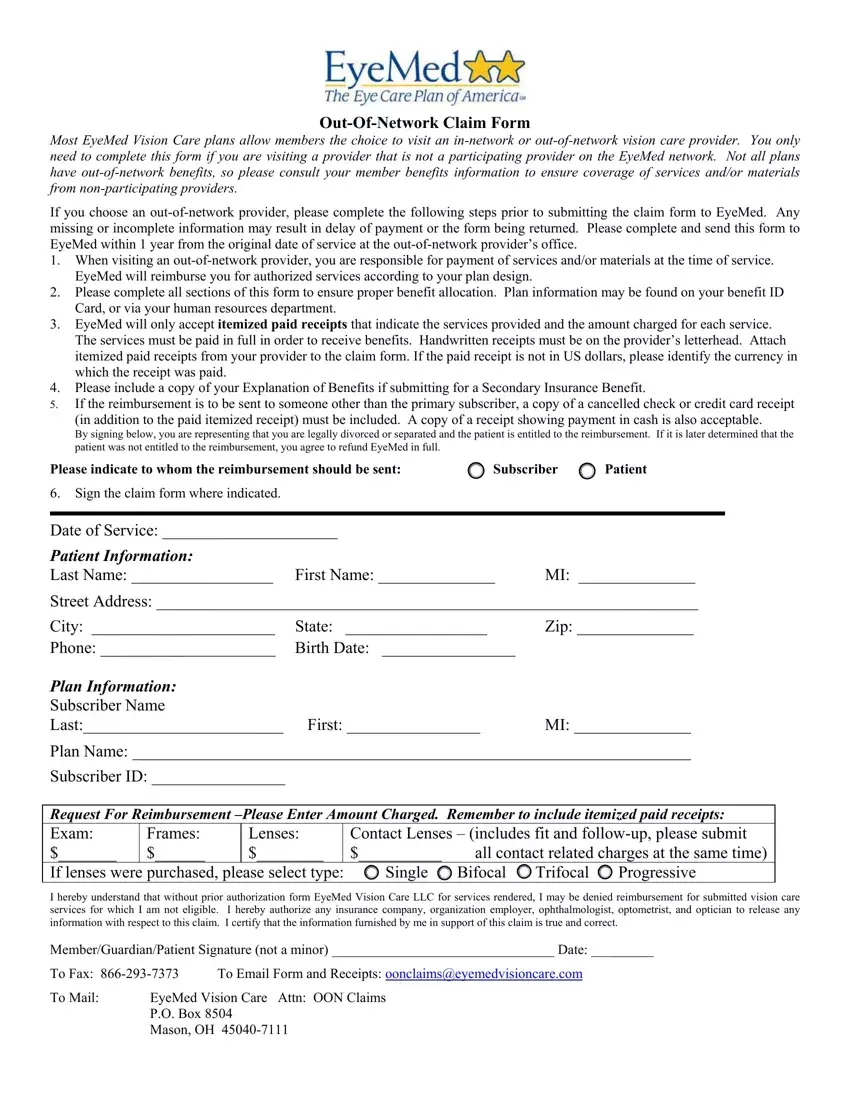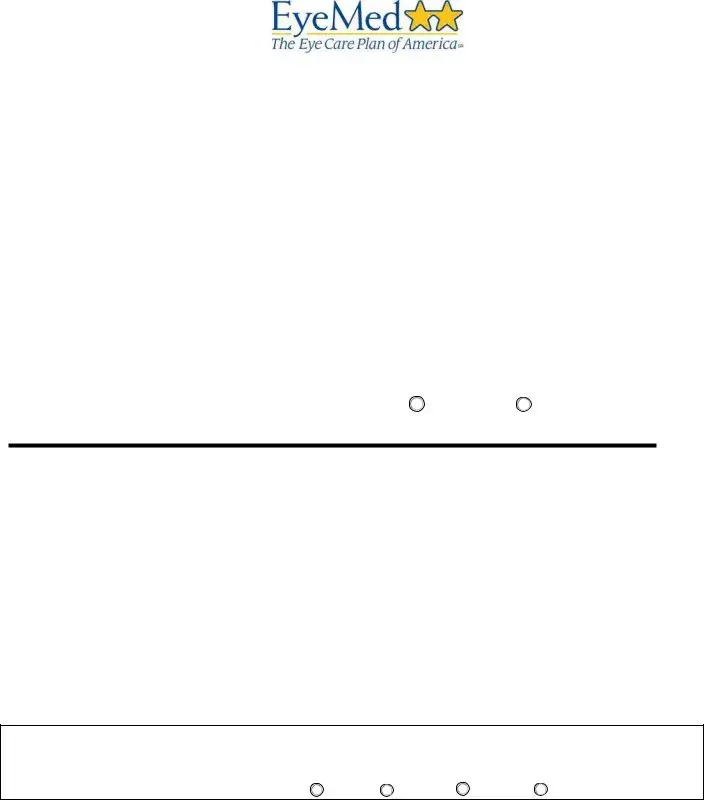Out-Of-Network Claim Form
Most EyeMed Vision Care plans allow members the choice to visit an in-network or out-of-network vision care provider. You only need to complete this form if you are visiting a provider that is not a participating provider on the EyeMed network. Not all plans have out-of-network benefits, so please consult your member benefits information to ensure coverage of services and/or materials from non-participating providers.
If you choose an out-of-network provider, please complete the following steps prior to submitting the claim form to EyeMed. Any missing or incomplete information may result in delay of payment or the form being returned. Please complete and send this form to EyeMed within 1 year from the original date of service at the out-of-network provider’s office.
1.When visiting an out-of-network provider, you are responsible for payment of services and/or materials at the time of service. EyeMed will reimburse you for authorized services according to your plan design.
2.Please complete all sections of this form to ensure proper benefit allocation. Plan information may be found on your benefit ID Card, or via your human resources department.
3.EyeMed will only accept itemized paid receipts that indicate the services provided and the amount charged for each service. The services must be paid in full in order to receive benefits. Handwritten receipts must be on the provider’s letterhead. Attach itemized paid receipts from your provider to the claim form. If the paid receipt is not in US dollars, please identify the currency in which the receipt was paid.
4.Please include a copy of your Explanation of Benefits if submitting for a Secondary Insurance Benefit.
5.If the reimbursement is to be sent to someone other than the primary subscriber, a copy of a cancelled check or credit card receipt
(in addition to the paid itemized receipt) must be included. A copy of a receipt showing payment in cash is also acceptable.
By signing below, you are representing that you are legally divorced or separated and the patient is entitled to the reimbursement. If it is later determined that the patient was not entitled to the reimbursement, you agree to refund EyeMed in full.
Please indicate to whom the reimbursement should be sent: |
Subscriber |
Patient |
6.Sign the claim form where indicated.
Date of Service: _____________________ |
|
Patient Information: |
|
Last Name: _________________ First Name: ______________ |
MI: ______________ |
Street Address: _________________________________________________________________
City: ______________________ |
State: _________________ |
Zip: ______________ |
Phone: _____________________ |
Birth Date: ________________ |
|
Plan Information: |
|
|
Subscriber Name |
|
|
Last:________________________ |
First: ________________ |
MI: ______________ |
Plan Name: ___________________________________________________________________
Subscriber ID: ________________
Request For Reimbursement –Please Enter Amount Charged. Remember to include itemized paid receipts:
Exam: |
Frames: |
Lenses: |
|
Contact Lenses – (includes fit and follow-up, please submit |
$_______ |
$______ |
$________ |
|
$__________ |
all contact related charges at the same time) |
If lenses were purchased, please SELECT type: |
Single |
Bifocal |
Trifocal |
Progressive |
I hereby understand that without prior authorization form EyeMed Vision Care LLC for services rendered, I may be denied reimbursement for submitted vision care services for which I am not eligible. I hereby authorize any insurance company, organization employer, ophthalmologist, optometrist, and optician to release any information with respect to this claim. I certify that the information furnished by me in support of this claim is true and correct.
Member/Guardian/Patient Signature (not a minor) ________________________________ Date: _________
|
|
|
To Fax: 866-293-7373 |
To Email Form and Receipts: oonclaims@eyemedvisioncare.com |
To Mail: |
EyeMed Vision Care Attn: OON Claims |
|
P.O. Box 8504 |
|
Mason, OH 45040-7111 |
Fraud Warning Statements
Arizona: For your protection Arizona law requires the following statement to appear on this form. Any person who knowingly presents a false or fraudulent claim for payment of a loss is subject to criminal and civil penalties.
Alaska: A person who knowingly and with intent to injure, defraud, or deceive an insurance company files a claim containing false, incomplete, or misleading information may be prosecuted under state law.
Arkansas: Any person who knowingly presents a false or fraudulent claim for payment of a loss or benefit or knowingly presents false information in an application for insurance is guilty of a crime and may be subject to fines and confinement in prison.
California: For your protection California law requires the following to appear on this form: Any person who knowingly presents false or fraudulent claim for the payment of a loss is guilty of a crime and may be subject to fines and confinement in state prison.
Colorado: It is unlawful to knowingly provide false, incomplete, or misleading facts or information to an insurance company for the purpose of defrauding or attempting to defraud the company. Penalties may include imprisonment, fines, denial of insurance and civil damages. Any insurance company or agent of an insurance company who knowingly provides false, incomplete or misleading facts or information to a policyholder or claimant for the purpose of defrauding or attempting to defraud a policyholder or claimant with regard to a settlement or award payable from insurance proceeds shall be reported to the Colorado Department of Insurance within the department of regulatory agencies.
District of Columbia: WARNING: It is a crime to provide false or misleading information to an insurer for the purpose of defrauding the insurer or any other person. Penalties include imprisonment and/or fines. In addition, an insurer may deny insurance benefits if false information materially related to a claim was provided by the applicant.
Florida: Any person who knowingly and with intent to injure, defraud, or deceive any insurer files a statement of claim or an application containing any false, incomplete or misleading information is guilty of a felony of the third degree.
Hawaii: For your protection, Hawaii law requires you to be informed that presenting a fraudulent claim for payment of a loss or benefit is a crime punishable by fines or imprisonment, or both.
Idaho: Any person who knowingly and with intent to defraud or deceive any insurance company, files a statement or claim containing a false, incomplete or misleading information is guilty of a felony.
Indiana: A person who knowingly and with intent to defraud an insurer files a statement of claim containing any false, incomplete or misleading information commits a felony.
Kentucky: Any person who knowingly and with intent to defraud any insurance company or other person files an application or claim for insurance containing any materially false information or conceals, for the purpose of misleading, information concerning any fact material thereto commits a fraudulent act, which is a crime.
Maine: It is a crime to knowingly provide false, incomplete or misleading information to an insurance company for the purpose of defrauding the company. Penalties may include imprisonment, fines or a denial of insurance benefits.
Minnesota: A person who files a claim with intent to defraud or helps commit a fraud against an insurer is guilty of a crime.
New Hampshire: Any person who, with a purpose to injure, defraud or deceive any insurance company, files a statement of claim containing any false, incomplete or misleading information is subject to prosecution and punishment for insurance fraud, as provided in § 638.20.
New Jersey: Any person who knowingly files a statement of claim containing any false or misleading information is subject to criminal and civil penalties.
New Mexico: Any person who knowingly presents a false or fraudulent claim for payment of a loss or benefit or knowingly presents false information in an application for insurance is guilty of a crime and may be subject to civil fines and criminal penalties.
New York: Any person who knowingly and with intent to defraud insurance company or other person files an application for insurance or statement of claim containing any materially false information or conceals for the purpose of misleading, information concerning any fact material thereto, commits a fraudulent act, which is a crime and shall also be subject to a civil penalty not to exceed $5,000 and the stated value of the claim for each such violation.
Ohio: Any person who, with intent to defraud, or knowing that he is facilitating a fraud against an insurer, submits an application or false claim containing a false or deceptive statement is guilty of insurance fraud.
Oklahoma: WARNING: Any person who knowingly and with intent to injure, defraud, or deceive any insurer makes any claim for the proceeds of an insurance policy containing any false, incomplete or misleading information is guilty of a felony.
Texas: Any person who knowingly presents a false or fraudulent claim for the payment of a loss is guilty of a crime and may be subject to fines and confinement in state prison.
Virginia: It is a crime to knowingly provide false, incomplete or misleading information to an insurance company for the purpose of defrauding the company. Penalties include imprisonment, fines and denial of insurance benefits.





